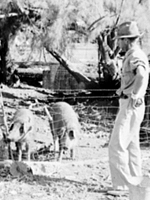
Kirby, James W.AboutKirby's job with the Bureau of Land Reclamation, specifically the Elephant Butte Irrigation District (EBID) and the Rio Grande.
Abstract
Tape 1, Side A
Kirby discusses his work with the Bureau of Reclamation, which he began in 1949. He describes his various roles and the formation of the various agricultural projects that began in southern New Mexico during that time. He mentions the names of several men who worked with the Bureau. He discusses the Bureau of Reclamation's relationship with and impact on Elephant Butte. He states that Elephant Butte is a "bastard child in the compact suit" between Texas and New Mexico, saying, "Elephant Butte loses every time." He feels that it was not until 1964 that everyone in the District started to work together for better quality water. He feels that Elephant Butte Irrigation District is a very important agricultural community. It is more than "just a place where you grow chili." He feels that the District is now in excellent hands and that the staff is knowledgeable. He believes that there is plenty of water for municipal use but not for agriculture and blames it on the cost of agricultural use water.
Tape 1, Side B
Kirby mentions that the Water Resources Research Institute (WRRI) at New Mexico State University probably has the most complete records of the early days of Elephant Butte Irrigation District. He casually mentions that while there are rumors of birth defects along the lower portions of the Rio Grande, he has not heard anything that would validate those claims. He states that he does not see any problems for Las Cruces as far a water supply goes unless Las Cruces turns into "two million people". But he does feel that urbanization and municipal use will take most of the water supply in El Paso. There is a brief discussion about the development of new chile and cotton varieties. The interview closes with a discussion about compact commissioners. |

